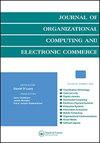The upside of showrooming: How online information creates positive spill-over for the brick-and-mortar retailer
IF 2
4区 管理学
Q3 COMPUTER SCIENCE, INFORMATION SYSTEMS
Journal of Organizational Computing and Electronic Commerce
Pub Date : 2019-10-02
DOI:10.1080/10919392.2019.1671738
引用次数: 9
Abstract
ABSTRACT The ubiquitous nature of mobile internet devices (i.e., smartphones and tablet computers) has led to an increase of their use within the retail environment as a shopping assistive technology. Consumers use them for a variety of shopping-related tasks, the most significant of which is researching product information. The use of these devices has clearly impacted how consumers shop, but what is not clear is how these devices affect shopper satisfaction, trust in the retailer and subsequent shopper intentions. The purpose of this paper is to better understand these relationships and extend existing research on the use of mobile internet devices in the retail industry. Several hypotheses are offered, and survey data from a nationwide random sample of consumers tested the hypotheses using structural equation modeling. Results indicate that shoppers’ satisfaction and trust in an online information source creates a spill-over effect on satisfaction and trust toward the retailer. Additionally, retailer repatronage intentions increase as a result of this spill-over effect. Contributions to emerging mobile marketing literature and theory, managerial implications, and future research recommendations are discussed.展厅的好处:在线信息如何为实体零售商创造积极的溢出效应
摘要移动互联网设备(即智能手机和平板电脑)的普遍性导致其作为购物辅助技术在零售环境中的使用增加。消费者将它们用于各种与购物相关的任务,其中最重要的是研究产品信息。这些设备的使用显然影响了消费者的购物方式,但尚不清楚的是,这些设备如何影响购物者的满意度、对零售商的信任以及随后的购物者意图。本文的目的是更好地理解这些关系,并扩展现有的关于移动互联网设备在零售业中使用的研究。提供了几个假设,来自全国随机消费者样本的调查数据使用结构方程模型对这些假设进行了检验。结果表明,购物者对在线信息源的满意度和信任度会对零售商的满意度和信赖度产生溢出效应。此外,由于这种溢出效应,零售商的重新托管意愿增加。讨论了对新兴移动营销文献和理论的贡献、管理启示以及未来的研究建议。
本文章由计算机程序翻译,如有差异,请以英文原文为准。
求助全文
约1分钟内获得全文
求助全文
来源期刊

Journal of Organizational Computing and Electronic Commerce
工程技术-计算机:跨学科应用
CiteScore
5.80
自引率
17.20%
发文量
7
审稿时长
>12 weeks
期刊介绍:
The aim of the Journal of Organizational Computing and Electronic Commerce (JOCEC) is to publish quality, fresh, and innovative work that will make a difference for future research and practice rather than focusing on well-established research areas.
JOCEC publishes original research that explores the relationships between computer/communication technology and the design, operations, and performance of organizations. This includes implications of the technologies for organizational structure and dynamics, technological advances to keep pace with changes of organizations and their environments, emerging technological possibilities for improving organizational performance, and the many facets of electronic business.
Theoretical, experimental, survey, and design science research are all welcome and might look at:
• E-commerce
• Collaborative commerce
• Interorganizational systems
• Enterprise systems
• Supply chain technologies
• Computer-supported cooperative work
• Computer-aided coordination
• Economics of organizational computing
• Technologies for organizational learning
• Behavioral aspects of organizational computing.
 求助内容:
求助内容: 应助结果提醒方式:
应助结果提醒方式:


